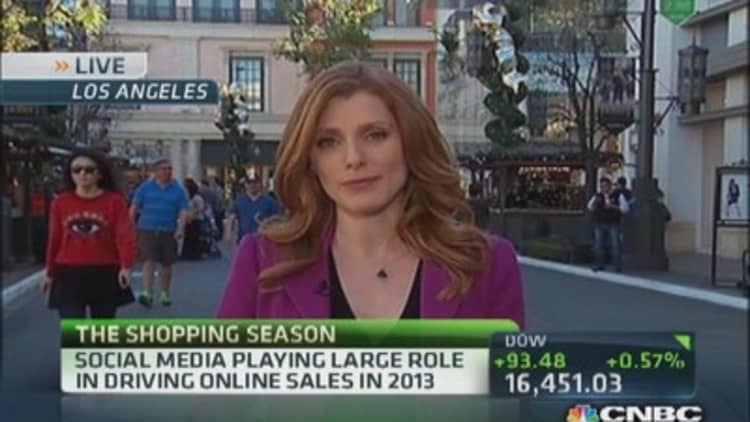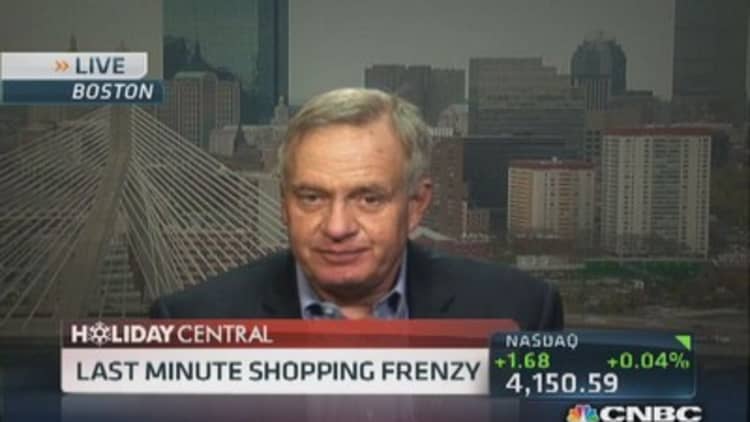The online sales hot streak has finally shown signs of cooling down.
According to the latest data from comScore, the final online shopping week before Christmas fell short of expectations, bringing the season total through Sunday to $42.8 billion from desktop devices. Though this is a 10 percent increase compared to the same 52-day period a year ago, the analytics firm had predicted all-digital holiday spending would reach $55.2 billion, and desktop would be $48.1 billion.
The most recent week had $4.9 billion in desktop online spending. All-digital holiday spending figures, which include smartphones and tablets, were not available at this time, but comScore said generally speaking, mobile devices add 2 percentage points to desktop sales.

"Our expectations for the online holiday shopping season anticipated that consumers would spend heavily later into the season out of necessity to make up for the highly compressed holiday shopping calendar this year," said comScore Chairman Gian Fulgoni. "Unfortunately that was not in the cards, as the final online shopping week saw considerably softer sales than anticipated, including zero billion-dollar spending days—although Monday and Tuesday came close."
(Read more: US holiday sales better than last year: MasterCard)
In addition to there being six fewer days between Thanksgiving and Christmas than last year, Fulgoni attributed the miss to heavy price discounts. "We'll look back at this holiday season as one where absolute dollar sales gains in consumer spending were held back by heavy retailer price discounting that occurred in an attempt to stimulate consumer demand," he said.

The final week before Christmas—which retailers were looking toward to salvage a slow start to the season—included Dec. 18, known as Free Shipping Day, when hundreds of retailers offer no-cost standard delivery. Although a comScore spokesperson had previously noted that this is typically one of the heaviest online spending days of the year, it failed to crack the top 10 this year.
In total, the season has boasted a total of 10 billion-dollar spending days, compared with 12 last year.
The news is the latest blow to retailers, as online has been considered the bright spot in a gloomy holiday picture weighed down by deep discounts and low traffic.
(Read more: As the clock ticks, retail traffic continues slide)
Things appeared to be trending in the right direction at the start of the season, when Cyber Monday broke the record for the biggest online spending day ever in the U.S., bringing in sales of $1.735 billion. Then, comScore announced that the week of Dec. 9 marked the first time ever that each day of the workweek saw online sales top $1 billion.
And just this past weekend, carriers UPS and FedEx said some of their holiday deliveries were delayed, attributing the slowness to heavy volume. Amazon also had to limit the number of new members to its Prime service, in order to ensure on-time delivery for its current members.
(Read more: Some shoppers waiting for post-Christmas deals)
R.W. Baird analyst Colin Sebastian further noted that peak day orders at Amazon increased nearly 40 percent this holiday.
"We view Amazon's reporting of peak day orders as a positive indicator, given that the company had discontinued reporting this metric in 2011 and 2012," Sebastian said.
The season's earlier robust online sales figures had provided a silver lining for retailers, who have seen three weeks of double-digit traffic declines, according to analytics firm ShopperTrak. The most recent week, which included the final weekend before Christmas, saw store traffic fall 21.2 percent compared to the same period last year.
(Read more: Web sales on a billion-dollar hot streak)
The dramatic decline in store traffic, paired with a shorter holiday calendar, have caused retailers to slash prices, open stores for marathon hours and kick off post-holiday sales before the presents are even unwrapped, all in an effort to capture sales from an uncertain consumer.
As a result, the National Retail Federation is projecting holiday sales will only rise by a marginal 3.9 percent this year, despite a projected double-digit growth in e-commerce.
—By CNBC's Krystina Gustafson. Follow her on Twitter @KrystinaGustafs.


